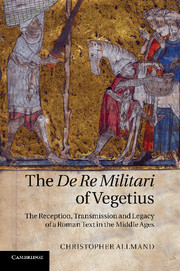 The De Re Militari of Vegetius
The De Re Militari of Vegetius Book contents
- Frontmatter
- Contents
- Figures
- Preface
- Abbreviations
- Introduction
- Part I The medieval reception
- Part II The transmission
- 6 Particular uses of the De re militari
- 7 Translations
- 8 Texts, drawings and illuminations
- 9 Excerpts
- 10 Vegetius in print
- Part III The legacy: the De re militari in medieval military thought and practice
- Appendix I Table of select terms used in translations of the De re militari
- Appendix II List of manuscripts of the De re militari
- Bibliography
- Index
- References
7 - Translations
from Part II - The transmission
Published online by Cambridge University Press: 07 October 2011
- Frontmatter
- Contents
- Figures
- Preface
- Abbreviations
- Introduction
- Part I The medieval reception
- Part II The transmission
- 6 Particular uses of the De re militari
- 7 Translations
- 8 Texts, drawings and illuminations
- 9 Excerpts
- 10 Vegetius in print
- Part III The legacy: the De re militari in medieval military thought and practice
- Appendix I Table of select terms used in translations of the De re militari
- Appendix II List of manuscripts of the De re militari
- Bibliography
- Index
- References
Summary
Translations were intended to transmit a work, in this case one originally written in Latin, to a wider public and into a later age. Rendering it into another language made it more specifically part of the culture of that age, although a more or less ‘straight’ translation retained its attachment to the time of its origins more easily than did one which incorporated adaptions made by the translator, whose task was, therefore, a pivotal one. He had the power to make a work both more widely accessible and better known to those unable, for whatever reason, to read the original. He could try to produce a metaphrase, a translation which stuck as closely as possible to the original. That could be a difficult task, requiring exceptional skills on the part of the translator. An alternative was an adaptation of some sort. One such might be a paraphrase, a free rendering of the original which, while keeping to the original meaning, omitted complex or obscure passages, or those which, in the translator's judgement, had little meaning for readers in his day. A second form of adaptation was to embellish the original by adding material to fill out or illustrate points made by the author so that these might be better appreciated by later readers, thus giving the original text a certain sense of modernity, and making its content more relevant to the thought and circumstances of later times. In this case, the translator was interpreting a work from a former age for readers living in his own age, and doing so in terms of the values which that age might attribute to it. The difficulties presented by the translator's position are summed up in the different words used to convey the nature of his work. It is interesting to observe the number of words used, in French for instance, to convey what translators thought they were doing: ‘translater’ was there, but so were ‘convertir’, ‘expliquer’, ‘transferer’ and ‘transporter’, while a translator might be described as a ‘translateur’ or an ‘interpréteur’, both words conveying different shades of meaning regarding the function of translation. In French the verb ‘traduire’ would come into use only in the sixteenth century.
- Type
- Chapter
- Information
- The De Re Militari of VegetiusThe Reception, Transmission and Legacy of a Roman Text in the Middle Ages, pp. 148 - 196Publisher: Cambridge University PressPrint publication year: 2011


